This article needs additional citations for verification .(February 2024) |
| |||||
| Decades: | |||||
|---|---|---|---|---|---|
| See also: | Other events of 1891 History of China • Timeline • Years | ||||
Events from the year 1891 in China .
This article needs additional citations for verification .(February 2024) |
| |||||
| Decades: | |||||
|---|---|---|---|---|---|
| See also: | Other events of 1891 History of China • Timeline • Years | ||||
Events from the year 1891 in China .
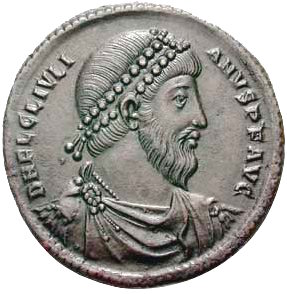
Year 361 (CCCLXI) was a common year starting on Monday of the Julian calendar. At the time, it was known as the Year of the Consulship of Taurus and Florentius. The denomination 361 for this year has been used since the early medieval period, when the Anno Domini calendar era became the prevalent method in Europe for naming years.

Mianyang is the second largest prefecture-level city of Sichuan province in Southwestern China. Located in north-central Sichuan covering an area of 20,281 square kilometres (7,831 sq mi) consisting of Jiangyou, a county-level city, five counties, and three urban districts. Its total population was 4,868,243 people at the 2020 Chinese census, of whom 2,232,865 live in its built-up area made of three urban districts.

The Ursuline Convent riots occurred August 11 and 12, 1834, in Charlestown, Massachusetts, near Boston, in what is now Somerville, Massachusetts. During the riot, a convent of Roman Catholic Ursuline nuns was burned down by a Protestant mob. The event was triggered by reported abuse of a member of the order, and was fueled by the rebirth of extreme anti-Catholic sentiment in antebellum New England.
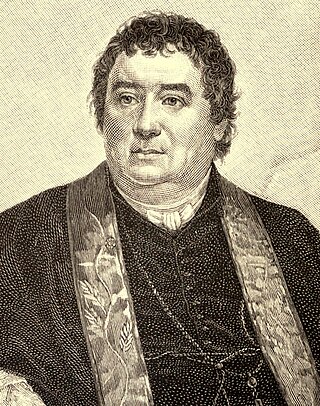
Benedict Joseph Fenwick was an American Catholic prelate, Jesuit, and educator who served as the Bishop of Boston from 1825 until his death in 1846. In 1843, he founded the College of the Holy Cross in Worcester, Massachusetts. Prior to that, he was twice the president of Georgetown College and established several educational institutions in New York City and Boston.
The Tientsin Massacre, was an attack on Christian missionaries and converts in the late 19th century during the late Qing dynasty. 60 people died in attacks on French Catholic priests and nuns. There was intense belligerence from French diplomats, and armed foreign intervention in Tianjin (Tientsin) in 1870. The incident nearly precipitated a war and marked an end to relative cooperation between foreign powers and the Tongzhi court, and adversely affected the ongoing renegotiation of the Treaties of Tientsin, first signed in 1858. French Catholic missionaries were active in China; they were funded by appeals in French churches. The Holy Childhood Association was a Catholic charity founded in 1843 to rescue Chinese children from infanticide. It was a target of Chinese anti-Christian protests led by the local gentry who saw the need to defend Confucianism. Rioting sparked by false rumors of the killing of babies led to the death of a French consul and provoked a diplomatic crisis.

The Canton Coup of 20 March 1926, also known as the Zhongshan Incident or the March 20th Incident, was a purge of Communist elements of the Nationalist army in Guangzhou undertaken by Chiang Kai-shek. The incident solidified Chiang's power immediately before the successful Northern Expedition, turning him into the paramount leader of the country.
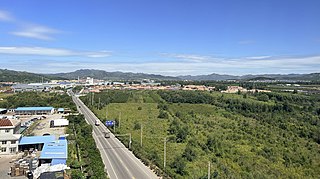
Pingquan is a county-level city of northeastern Hebei province, China, bordering Liaoning province to the east. It has a population of 470,000 residing in an area of 3,297 km2 (1,273 sq mi). It is a centre of trade and business, and gold and silver are mined nearby.

The Martyr Saints of China, or Augustine Zhao Rong and his Companions, are 120 saints of the Catholic Church. The 87 Chinese Catholics and 33 Western missionaries from the mid-17th century to 1930 were martyred because of their ministry and, in some cases, for their refusal to apostatize.
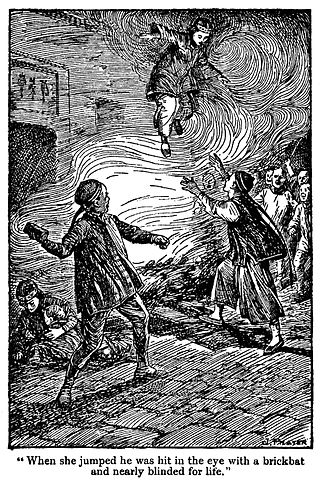
The Yangzhou riot of August 22–23, 1868 was a brief crisis in Anglo-Chinese relations during the late Qing dynasty. The crisis was fomented by the gentry of Yangzhou who opposed the presence of foreign Christian missionaries in the city, who claimed that they were legally residing under the provisions of the Convention of Peking. Threats against the missionaries were circulated by large character posters placed around the city. Rumors followed that the foreigners were stealing babies and killing them to make medicine.
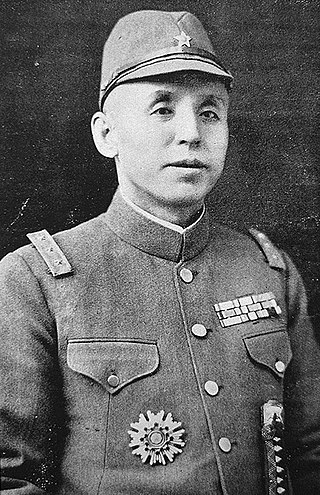
Li Shouxin was a pro-Japanese commander in the Manchukuo Imperial Army and later the Mengjiang National Army.
The Roman Catholic Diocese of Lu'an/Changzhi is a diocese located in the city of Lu'an in the ecclesiastical province of Taiyuan in China. Currently, in standard Mandarin, the name of the city is pronounced "Luan". In the local dialect, it was pronounced, "Lu-ngan", which was why early accounts by Christian missionaries call it by that name. The American presbyterian publication "The Chinese recorder and missionary journal, Volume 3" calls it "Lu-ngan-fu".

The Khorchin are a subgroup of the Mongols that speak the Khorchin dialect of Mongolian and predominantly live in northeastern Inner Mongolia of China.
Events from the year 1692 in China.

Christianity is a minority religion in the Chinese province of Sichuan. The Eastern Lipo, Kadu people and A-Hmao are ethnic groups present in the province.
Anti-Mongolianism, also called the Anti-Mongolian sentiment has been prevalent throughout history, often perceiving the Mongols to be barbaric and uncivilized people with a lack of intelligence or civilized culture.

China's Next Top Model Cycle 5 is the fifth cycle of the Chinese reality TV series, based on the international version and spin-off to the original, America's Next Top Model. It began to air on 21 May 2015 at 9:20 pm (UTC+8). This was the first season of the show to feature male contestants. The hosts were Chinese female supermodel Lynn Hung and Chinese male supermodel Zhang Liang.
The anti-missionary riot in Wuhu, Anhui, China occurred in May 1891, against Roman Catholic mission.
Ye Zhichao was a Chinese general of the Qing Dynasty who fought in the First Sino-Japanese War, being the commander of Qing forces stationed in Korea.

The Protestant mission began in the Chinese province of Sichuan in 1877, when premises were rented by the China Inland Mission in Chungking. However, it grew rather slowly, it was not until the late 1980s that Protestantism experienced rapid growth. The two largest denominations in the province before 1949 were Anglicanism and Methodism.

The presence of the Catholic Church in the Chinese province of Sichuan dates back to 1640, when two missionaries, Lodovico Buglio and Gabriel de Magalhães, through Jesuit China missions, entered the province and spent much of the 1640s doing evangelism.